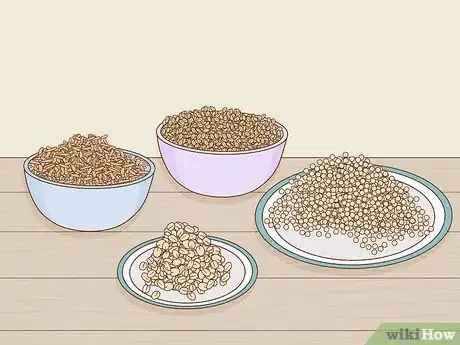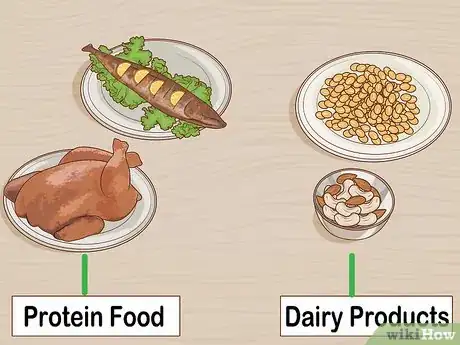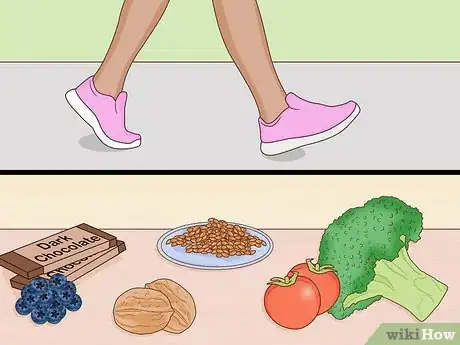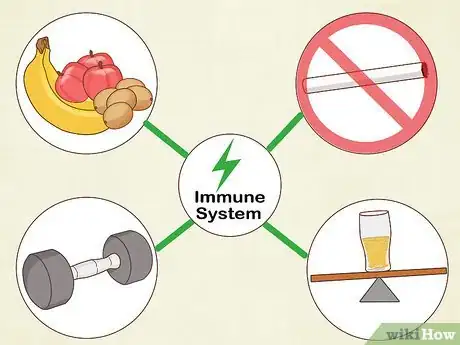This article was medically reviewed by Luba Lee, FNP-BC, MS. Luba Lee, FNP-BC is a Board-Certified Family Nurse Practitioner (FNP) and educator in Tennessee with over a decade of clinical experience. Luba has certifications in Pediatric Advanced Life Support (PALS), Emergency Medicine, Advanced Cardiac Life Support (ACLS), Team Building, and Critical Care Nursing. She received her Master of Science in Nursing (MSN) from the University of Tennessee in 2006.
There are 27 references cited in this article, which can be found at the bottom of the page.
This article has been viewed 101,725 times.
Your body is comprised of a complex set of interconnected systems, such as the nervous system, respiratory system, digestive system, cardiovascular system, immune system, and musculoskeletal system. These systems are intricately connected, so improving one area can have a big impact on your health. For instance, according to the American Psychiatric Association, simply relieving your overall stress levels can have a positive impact on every system in your body![1] Keep reading for more tips on how to make these systems stronger.
Steps
Eating a Healthy Diet
-
1Incorporate fruits and vegetables into your diet. A diet rich in fruits and vegetables can improve your cardiovascular system, reducing your chance of developing high blood pressure or experiencing heart disease or stroke. It can also improve the functioning of your digestive system by providing your body with fiber to prevent constipation.[2]
- In order to maintain a well-balanced diet, you should consume 2 cups of fruit and 2.5 cups of vegetables each day.[3]
- Try and eat a variety of different vegetables, including green leafy vegetables like cabbage, spinach, and kale; bright orange, yellow, and red vegetables like carrots, peppers, and tomatoes; as well as root vegetables, like potatoes, yams, onions, and garlic.
-
2Consume whole grains. Whole grains contain a variety of important nutrients such as fiber, iron, magnesium, zinc, B vitamins, etc. that help with the functioning of multiple body systems. These contribute to increased blood circulation, proper digestion, increased immune system functioning, and allow the nervous system to send signals throughout the body.[4]
- Some good sources of whole grains include oats, wheat, brown rice, rye, quinoa, and couscous.
Advertisement -
3Eat high-quality protein. Protein helps your immune system function properly, maintains your cardiovascular and respiratory systems, and rebuilds muscles following a workout. You should consume 0.8 g of protein per 1 kilogram (2.2 lb) of body weight each day.[5]
- Some good sources of protein include fish, poultry, dairy products, beans, nuts, and seeds.
-
4Avoid trans fats. Trans fats raise the LDL (bad cholesterol) and decrease the HDL (good cholesterol) in your body. This can lead to serious health issues, such as heart disease. As a result, you should avoid foods that contain trans fats, such as fried foods, chips, commercial baked goods (cakes, cookies, crackers), and margarine.[6]
- Instead, you should try and consume saturated fats found in meat and dairy products, as well as omega 3 fatty acids, which are found in salmon and fish oils.
-
5Keep your body hydrated. Water is an extremely important part of your diet; without it, you would not survive more than a few days. Drinking water helps your muscles and digestive system function properly. In order to stay healthy, you should eat and drink enough fluids to replenish the water you lose throughout the day through perspiration, urine, and even breath. The amount of water necessary varies between individuals and is often impacted by your overall health and activity level.[7]
- An adult male should drink approximately 3 litres (100 fl oz) a day and an adult woman should drink approximately 2.2 litres (74 fl oz) each day.
-
6Drink alcohol in moderation. A glass of wine a day is not going to have a negative impact on your body systems; however, excessive drinking can damage your heart and may lead to heart disease and stroke. It also slows down brain functioning, causes liver damage, and lowers the functioning of your immune system over time.[8]
-
7Take a daily multivitamin or specific vitamins to enhance your nutrition. If you are concerned that you are not getting all of the essential nutrients from your diet, then you might want to take a daily multivitamin or include some individual supplements as insurance.[9] Some good vitamins to include for strengthening every system in your body include:
- Vitamin C
- D3
- Zinc
Exercising Regularly
-
1Engage in physical activity daily. Exercise is very important to maintaining a healthy body. It can enhance your cardiovascular system, boost your immune system, and strengthen your musculoskeletal system. You should try to incorporate some form of physical activity into your daily routine. This could even be something as simple as going for a half-hour walk.[10]
- Other types of exercise include running, swimming, cycling, and playing a variety of sports.
-
2Try weight training. Weight training is an excellent way to build muscle and strengthen your musculoskeletal system. You can target a variety of different muscles by bench pressing, performing squats and deadlifts, and engaging in bodyweight exercises such as push-ups and sit-ups.[11]
-
3Give your body a chance to rest and recover. In order for your muscles to grow, your body needs time to rest and recover. Make sure to have at least two days each week where you do not engage in any vigorous physical activity. You can still remain active, but should not push your body too hard.[12]
- For example, you could go for a short walk or leisurely bicycle ride.
Living a Healthy Lifestyle
-
1Don’t smoke. Smoking negatively impacts almost every organ in the body. When you smoke, you inhale toxins into your lungs and respiratory system that greatly impact the functioning of your respiratory system. Over time, this may lead to the development of cancer. Similarly, smoking raises your blood pressure and can lead to heart disease or heart failure.[13]
- Smoking can also negatively impact your digestive system. For example, it has been linked to various cancers that can develop throughout the digestive tract, such as the mouth, esophagus, stomach, liver and colon.[14]
-
2Get enough sleep each night. It is no surprise that sleep deprivation can cause you to feel overtired and fatigued, but it can also decrease the functioning of your immune system. When you are asleep your body fights foreign bodies that may cause illness or infection. Your cognitive functioning can also be impacted by a lack of sleep. If you are not getting enough sleep, you may experience:[15]
- Fatigue throughout the day
- A lack of focus
- Inability to learn and problem solve
- Slow reaction times
- Difficulty making decisions and remembering
-
3Reduce stress levels. Stress can impact the way your body functions, leading to a weaker immune system, nervous system, and cardiovascular system. In order to reduce stress try meditation, breathing exercises, and yoga to help you relax.[16]
- You can also try reading or engaging in a hobby that you enjoy.
Targeting Each System
-
1Strengthen your cardiovascular system. The cardiovascular system is responsible for circulating blood, oxygen, and nutrients throughout your body. In order to do this efficiently, you need to have a strong heart muscles. The best way to strengthen your cardiovascular system is through a combination of regular exercise and a healthy diet.[17] [18]
- For instance, you should take part in some form of cardiovascular exercise, such as running, cycling, walking, or swimming. You can also try interval training and weight lifting.[19]
- You should also eat heart-healthy foods, such as blueberries, flaxseeds, walnuts, tomatoes, broccoli, dark chocolate[20] , and green tea.
-
2Boost your immune system. Your immune system protects your body from invasive micro-organisms that can cause illness or disease. There is no magic way to boost your immune system and prevent your body from getting sick. Researchers are currently looking into connections between immune functioning and diet, exercise, age, and psychological stress. The best thing you can do to boost your immune system is lead a healthy lifestyle:[21]
- Don't smoke
- Eat a diet with lots of fruits and vegetables, and low in saturated fats
- Exercise regularly
- Drink alcohol in moderation
- Get eight hours of sleep per night
- Maintain a healthy weight
- Take steps to avoid infections, such as washing your hands and cooking meats thoroughly
- Visit your doctor regularly for check ups
-
3Enhance the functioning of your nervous system. The nervous system is one of the most complex and important systems in your body. It is responsible for responding to external and internal stimuli, which includes vital functions such as breathing, heartbeat, hunger, thirst, temperature regulation, and emotional responses. To keep your nervous system healthy you should:[22]
- Eat a diet that includes oatmeal, baker's yeast, and foods high in magnesium (i.e. green leafy vegetables, fruits, dark chocolate, nuts, and seeds) and omega 3 fatty acids (i.e. salmon, broccoli, sardines, flaxseeds, or supplements).
- Take deep breaths to stimulate relaxation and ease stress.[23]
- Expose yourself to sunlight, which contains vitamin D and can prevent nervous system-related diseases, such as schizophrenia and multiple sclerosis.[24]
-
4Improve your respiratory system. The respiratory system includes the nose, throat, windpipe, and lungs and is crucial for regulating your oxygen intake.[25] Pollution, smoking, irritants, and infectious diseases can weaken your respiratory system. Improvement to your environment and lifestyle can impact your respiratory system. For example, you should:[26]
- Avoid smoking
- Reduce your intake of fatty foods, such as cheese, red meat, and lard.
- Limit your exposure to common allergens, such as dust mites, pollen, mold, and animal dander by keeping your home clean.
- Exercise regularly by walking, jogging, swimming, or cycling.
- Reduce your exposure to pollution by wearing a mask if you live in a smoggy city or urban area.
- Stay hydrated by drinking eight glasses of water each day.
-
5Maintain a healthy digestive system. The digestive system is responsible for converting food into energy.[27] A healthy digestive system can impact your mood, energy levels, and can even help fight off illnesses. In order to maintain a healthy digestive system you should:[28]
- Eat fruits and vegetables daily
- Limit your intake of foods that are difficult to digest, such as beef, pork, and processed meats
- Consume foods that contain probiotics, such as yogurt, kefir, kimchee, and sauerkraut. These foods contain healthy bacteria that will fight off bad bacteria in your gut.
- Reduce your intake of foods that contain added sugars, such as baked goods, sodas, and certain juices.
References
- ↑ https://www.apa.org/topics/stress/body
- ↑ https://www.hsph.harvard.edu/nutritionsource/what-should-you-eat/vegetables-and-fruits/
- ↑ https://www.ers.usda.gov/amber-waves/2019/june/americans-still-can-meet-fruit-and-vegetable-dietary-guidelines-for-210-260-per-day/
- ↑ https://www.hsph.harvard.edu/nutritionsource/what-should-you-eat/whole-grains/
- ↑ https://www.helpguide.org/articles/healthy-eating/choosing-healthy-protein.htm
- ↑ http://www.mayoclinic.org/diseases-conditions/high-blood-cholesterol/in-depth/trans-fat/art-20046114
- ↑ http://www.mayoclinic.org/healthy-lifestyle/nutrition-and-healthy-eating/in-depth/water/art-20044256
- ↑ https://www.niaaa.nih.gov/alcohol-health/alcohols-effects-body
- ↑ https://www.hsph.harvard.edu/nutritionsource/multivitamin/
- ↑ http://www.health.harvard.edu/staying-healthy/how-to-boost-your-immune-system
- ↑ https://www.mayoclinic.org/healthy-lifestyle/fitness/in-depth/weight-training/art-20047116
- ↑ https://www.acefitness.org/education-and-resources/lifestyle/blog/7176/8-reasons-to-take-a-rest-day/
- ↑ https://smokefree.gov/quitting-smoking/reasons-quit/health-effects
- ↑ https://www.hopkinsmedicine.org/health/conditions-and-diseases/smoking-and-the-digestive-system
- ↑ https://www.nhlbi.nih.gov/health/health-topics/topics/sdd/why
- ↑ http://www.apa.org/helpcenter/stress-body.aspx
- ↑ https://www.britannica.com/science/human-cardiovascular-system
- ↑ https://www.nhlbi.nih.gov/health-topics/how-heart-works
- ↑ https://www.ucdenver.edu/docs/librariesprovider65/clinical-services/sports-medicine/training-for-cardiovascular-fitness.pdf?sfvrsn=a0345bb9_2
- ↑ https://www.hsph.harvard.edu/nutritionsource/food-features/dark-chocolate/
- ↑ http://www.health.harvard.edu/staying-healthy/how-to-boost-your-immune-system
- ↑ https://steptohealth.com/ways-strengthen-nervous-system/
- ↑ https://www.uofmhealth.org/health-library/uz2255
- ↑ https://www.ncbi.nlm.nih.gov/pmc/articles/PMC5713448/
- ↑ https://my.clevelandclinic.org/health/articles/21205-respiratory-system
- ↑ http://www.lung.org/lung-health-and-diseases/protecting-your-lungs/
- ↑ https://www.betterhealth.vic.gov.au/health/conditionsandtreatments/digestive-system
- ↑ https://my.clevelandclinic.org/health/articles/keeping-your-digestive-tract-healthy




















-Step-17-Version-2.webp)























































Medical Disclaimer
The content of this article is not intended to be a substitute for professional medical advice, examination, diagnosis, or treatment. You should always contact your doctor or other qualified healthcare professional before starting, changing, or stopping any kind of health treatment.
Read More...